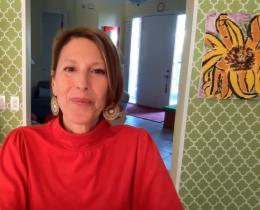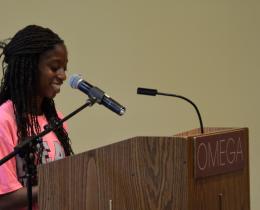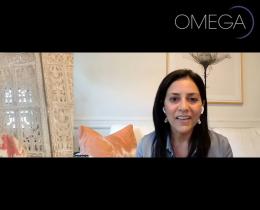Omega: How can writing help the future of feminism?
Erica: I saw an interesting segment on the news that made me very hopeful. A group of young progressives were talking about how writing can change the way people look at reality. They discussed how in our parents’ generation smoking was depicted as cool, and in our generation, smoking is depicted as suicide. We have changed the image of smoking from something appealing to something that is really about destroying yourself. They thought if it could be done with smoking, maybe we can do it for the environment.
I think writers can make it cool to be pro-women. Writers can change the image of things and how we look at things—at the basis of every revolution there are books. I’d like to see us sufficiently change the view of women so we’re not imprisoned by ideas. That’s the best reason to be a writer.
Omega: You won Poetry magazine's Bess Hokin Prize and published seven volumes of poetry. What moves you to write poetry?
Erica: Poems don’t always come. But there are times when they tend to come in waves, and you have to be there to catch them when they come. I tend to write poetry at certain times in my life. Lately, I’ve been communicating with a friend and we’ve been sending each other poems to get each other going, and that’s helpful.
Omega: Do you struggle with self-doubt around the writing process? What's your advice for others who do?
Erica: Writing is very lonely. You’re by yourself. You don’t have people reading each chapter and saying, “Good, I love it.” You’re working on your own, and doubt is built into anything that you do on your own. I think self-doubt is part of being a writer. I don’t think there’s a cure for it.
I think it’s good if writers always try to think like a beginner. I’m not interested in reading the kind of writer who develops a formula and just keeps doing it over and over again. I know publishers love that because it’s easier to sell, but it doesn’t interest me. I want to see people try new things and attempt to make it new each time.
Omega: When you feel self-doubt about your writing, do you take a day off and get away, or do you work harder?
Erica: There are always other things to read or research. I’ve written a number of historical novels, and I can always do more research. But there’s no magical cure for self-doubt. Self-doubt can even be valuable. I would love to write a book in which I experience no self-doubt, but I think that’s unrealistic.
Philip Roth says that one of his favorite books is Sabbath’s Theater because it came flowing out of him. We do tend to love works that come flowing out, but sometimes they come flowing out only after you’ve thrown away a million other things and found a new voice. So you’re always searching, as a writer, and you’re doing it alone, and that’s hard.
Omega: Much of your writing and poetry has a feminist slant to it. How do these two loves unite for you?
Erica: I’ve written a lot about women’s lives. I’ve tried in my novels to write books about women that don’t really exist. I’m really interested in writing books that don’t yet exist. I’m fascinated with that also in poetry.



